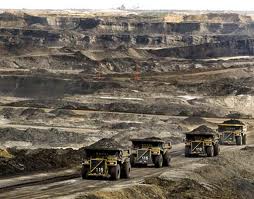 Earlier this month James Hansen wrote a trenchant op-ed in the New York Times. He reiterated the warning that the exploitation of the Canadian tar sands will be game over for the climate, spelt out some of the long-term drought consequences for the US of continued warming and identified notable heat waves of the last decade as most likely due to human-caused climate change. He was clearly anxious to drive home the message that humanity is in serious danger if we carry on exploiting all the fossil fuels we can find. “If it sounds apocalyptic, it is.”
Earlier this month James Hansen wrote a trenchant op-ed in the New York Times. He reiterated the warning that the exploitation of the Canadian tar sands will be game over for the climate, spelt out some of the long-term drought consequences for the US of continued warming and identified notable heat waves of the last decade as most likely due to human-caused climate change. He was clearly anxious to drive home the message that humanity is in serious danger if we carry on exploiting all the fossil fuels we can find. “If it sounds apocalyptic, it is.”
On cue, journalist Andrew Revkin in his Dot Earth blog on the New York Times a few days later reported a meteorologist, Martin Hoerling, who claimed that Hansen had exceeded his brief as a scientist and allowed his policy commitment to overrule scientific caution. Revkin then asked climatologist Kerry Emanuel for his reaction to both Hansen and Hoerling. He received the comment that Emanuel saw overstatements on all sides, and, unsurprisingly, aligned himself with Emanuel.
But there was more to come on Revkin’s blog. A few days later he posted a response to Hoerling by Dan Miller who had assisted Hansen in the preparation of his op-ed. Miller had also been in touch with Emanuel to find out what his concerns were. It turned out they were hardly substantial:
He responded that he is in agreement with Dr Hansen’s main points, though he felt that Jim should not have stated his case with such confidence. There is no certainty in science (the strongest level of scientific confidence is called a “theory”) and Jim did not remind people that risk, by its very nature, entails uncertainty. Kerry also said that he agrees with Jim’s main conclusion that we need to begin reducing greenhouse gas emissions now.
I’m not a scientist, but I try to follow Hansen’s papers and am grateful for the care he takes to make them understandable to a wide audience, an intention which he mentioned when turning down Revkin’s invitation to reply to Hoerling and Emanuel. He told Revkin, incidentally, that he had several papers well along in the publication process which would show the criticisms far off the mark, but that editors wish him not to discuss them in blogs.
As a lay person I’m able to understand the degree of uncertainty that must attend scientific theory. But what interests me more when it comes to climate science is the degree of risk that the science is pointing to. Allowing for all the uncertainties, as in fact it’s my experience that Hansen and his fellow scientists always do, there remains a solid block of evidence that is deeply concerning for the human future – and in some cases for the human present.
As a concerned human being I don’t want scientists to soft-pedal on that evidence. It’s all too apparent that the population at large has little understanding of how momentous it is. Cautious, carefully hedged statements may be understood by fellow scientists, but in the public arena it’s very necessary that the full seriousness of what is happening be laid out unambiguously and regularly. Consider this early paragraph in Hansen’s op-ed:
Canada’s tar sands, deposits of sand saturated with bitumen, contain twice the amount of carbon dioxide emitted by global oil use in our entire history. If we were to fully exploit this new oil source, and continue to burn our conventional oil, gas and coal supplies, concentrations of carbon dioxide in the atmosphere eventually would reach levels higher than in the Pliocene era, more than 2.5 million years ago, when sea level was at least 50 feet higher than it is now. That level of heat-trapping gases would assure that the disintegration of the ice sheets would accelerate out of control. Sea levels would rise and destroy coastal cities. Global temperatures would become intolerable. Twenty to 50 percent of the planet’s species would be driven to extinction. Civilization would be at risk.
That seems to me to be just telling it how it is. Is there anywhere in the course of the paragraph where there’s need for a statement acknowledging uncertainty? Replacing “would” by “might”, for example? Why on earth would one do that? These are disasters of a magnitude difficult for us all to comprehend, and the evidence is strong that they are what coming generations will face if we carry on extracting and burning all the fossil fuel we can find. It makes no difference to me to be told that the probability is extremely high rather than certain. It is in either case an appalling prospect which we will be utterly foolish to risk.
Any climate scientist willing to tell that to the public is performing what seems to me to be an important public service. Any journalist who keeps adding “but you can’t be certain” is, one hopes unwittingly, diluting the warning. Welcome, perhaps, to some, but no useful service.

Well reported and nicely summarised, Bryan.